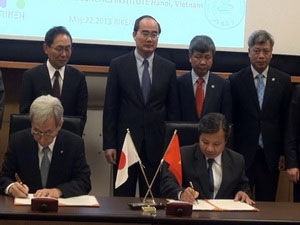Vietnam-Japan is studying genetically modified cassava varieties
Vietnamese and Japanese scientists on May 22 agreed to study the application of genetic modification techniques to increase productivity and quality in Vietnamese cassava while reducing the harmful effects of soil erosion. this plant.

Representatives of two research institutes of Vietnam and Japan signed an agreement. (Photo: Huu Thang / Vietnam +)
On May 22, in Yokohama City, the Japanese Institute of Physical and Chemical Research (RIKEN) signed a genetic cooperation agreement on genetic modification with the Vietnam Institute of Agricultural Genetics to create an effective cassava variety. High economy.
RIKEN is one of Japan's leading research institutes in chemistry, physics, biology, medicine and technology.
Speaking at the signing ceremony, Deputy Prime Minister Nguyen Thien Nhan expressed his hope that the project will be successful, creating an important premise for research cooperation on the agricultural sector between the two countries in the future.
Mr. Kenji Oeda, a member of RIKEN's Board of Directors, stressed that Vietnam is an important partner of the Institute in Southeast Asia and the agricultural sector is an area of special interest to scientists in both countries.
Director of the Vietnam Institute of Agricultural Genetics Le Huy Ham said recently, cassava was identified as the only suitable biofuel crop for Vietnam in the coming time and cassava has become one of the 10 important export products of Vietnam with turnover in 2012 reached 1.2 billion USD.
According to Mr. Ham, in the world today, to create a genetically modified crop requires a cost of 50-100 million USD and takes about 7-10 years.
RIKEN and Vietnamese scientists also hope that the research results will bring success, helping farmers increase crop productivity.
Cassava is a species that brings economic efficiency, contributes to poverty reduction but contains potential risks causing soil erosion and desertification.
Countries such as China and Thailand, which were formerly the largest cassava growing countries in Asia and supplied most of the cassava flour to the world, have recently reduced cassava cultivation due to the weaknesses mentioned. on.
If the study of transgenic cassava results in success, this could be a solution to the problem of the cassava root which minimizes the harmful effects of soil degradation and increases crop productivity.
The research leader of the project, Professor Kazuo Shinozaki, said the scientists of the two institutes will jointly study genetically modified cassava in order to enhance the ability of starch synthesis in plants, creating a quality plant high.
Professor Shinozaki announced that here, the two sides will establish a common laboratory in Vietnam and this will be the basis for the two countries' scientists to strengthen cooperation in the field of research.
- Vietnam has allowed the cultivation of three genetically modified corn varieties
- Recognizing 4 genetically modified corn varieties for food
- Genetically modified plants still cause doubts
- Hybrid cassava varieties yield 5 times higher
- Countering genetically modified corn causes cancer in mice
- Genetically modified food in Vietnam ever since?
- Genetically modified plants and the future in Vietnam
- 'No one can predict the harmful effects of GM crops'
- Genetically modified salmon in the US is controversial
- Vietnam will have high-yielding genetically modified food
- Things you should know about GMO genetically modified foods
- Genetically modified insects threaten genetically modified plants
 Vietnam 5th Asian champion on fuel-efficient vehicles
Vietnam 5th Asian champion on fuel-efficient vehicles We can read all NASA studies completely free of charge
We can read all NASA studies completely free of charge Singer and songwriter Bob Dylan won the 2016 Nobel Prize for Literature
Singer and songwriter Bob Dylan won the 2016 Nobel Prize for Literature Scientific revolution in Asia
Scientific revolution in Asia Tapioca flour effect?
Tapioca flour effect?  Should drink raw or cooked cassava flour?
Should drink raw or cooked cassava flour?  Hybrid cassava varieties yield 5 times higher
Hybrid cassava varieties yield 5 times higher  First appeared cassava mealybug damage pink powder in Vietnam
First appeared cassava mealybug damage pink powder in Vietnam  Production of microbial fertilizer from cassava residue
Production of microbial fertilizer from cassava residue  Find raw materials for Ethanol production plant
Find raw materials for Ethanol production plant 